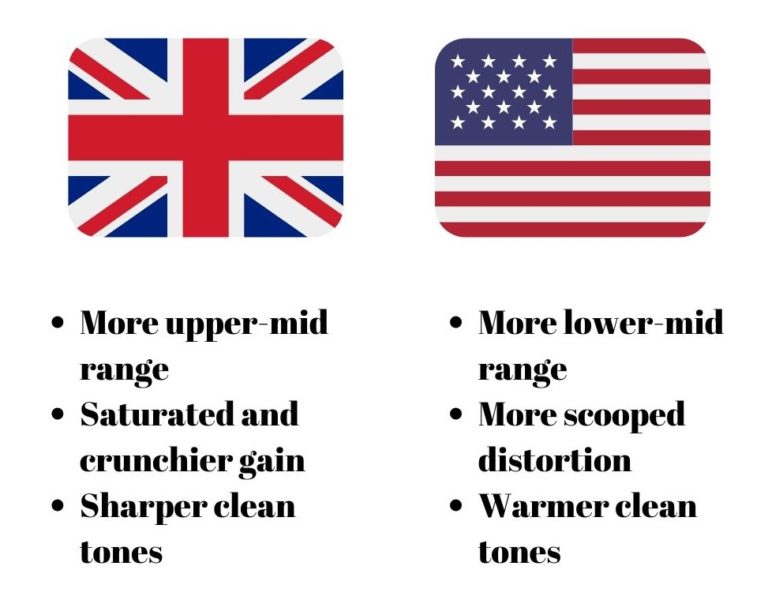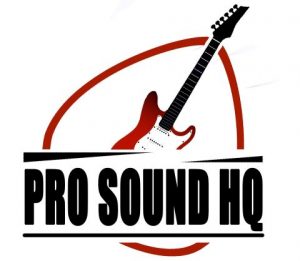There’s no question that your amplifier is super important when it comes to dictating the sound of your overall rig. So in order to get the perfect tone, you’ll need to select the best amplifier for you.
There is a big debate in the guitarist community over which are better, British or American amps? The truth is, one isn’t better than the other. But they do sound different.
It can be hard to pin down exactly what the sound differences between British and American amps is, but in this post I’ll do my best to address it. So let’s go started!
American vs. British Amps
British amps tend to place more emphasis on the mid-range and upper-mid range frequencies than American amps. American amps usually play emphasis on the treble and bass frequencies. This causes American amps to have a “scooped” sound and British amps to sound more gritty and crunchy.
However, that is a very generalised answer. It really depends on which amp manafactuer and models you’re comparing. So to give you a more accurate picture, I’ll go through the sounds and characteristics of four popular amp manufacturers from each different region.

British Amps
British amplifiers are best known for having a more pronounced upper-mid range than American amps. The result, is a narrow more precise tone that’s sharper and crunchier. However, each amp sounds different, so let’s discuss a little about some of the main British amp brands.
- Marshall
- Orange
- Vox
- Blackstar
Marshall Amps
Marshall is one of the most iconic brands and often recognised for producing classic British tones. They’ve been around for decades and have been associated with loads of famous guitarists from Eric Clapton to Noel Gallagher.
Marshall amps are known for their power and grit primarily. It’s the distortion tone that they produce that is what makes them so iconic. Generally, Marshall amps are described as having a lot of bite and crunch, primarily because they favour high (treble) frequencies.
Orange Amps
Orange Amps are again hugely popular with a range of guitarists like Black Sabbath’s Tony Lommi and Led Zeppelin’s Jimmy Page. They are again, an amplifier manufacturer best known for their distorted tones.
They are very popular amongst metal and hard rock guitarists for their powerful and punchy output. When pushed, Orange amps can produce a fuzz type effect. They do nice clean tones as well though. However, it’s not a smooth clean tone, but quite gritty instead.
Vox Amps
Vox is another British amplifier manufacturing giant with a lot of history. Queen’s Brian May and the Beatles were well known for using Vox amps to create his signature tone.
Vox amplifiers are a bit smoother and more subtle than Marshall and Orange amps. For this reason, they are very popular with guitarists who play cleaner tones. That doesn’t mean that they can’t handle the gain though. The distorted tone favours upper mid and treble frequencies so is quite sharp sounding.
Blackstar Amps
Blackstar is one of newer amplifier manafacturers that has made a name for themselves over the last decade or so. Despite not having as decorated a history as the other British amp manufacturers, Blackstar still definitely deserves a place on this list.
What’s really unique about Blackstar amps is their Infinite Shape Feature (ISF) tone control. If you turn it counter-clockwise then you’ll get more midrange which sounds more British. But if you turn it clockwise, then you’ll get less mid-range, meaning it sounds more American.
American Amps
American amps typically place more emphasis on the low-mid range than British amps. The result is a softer, smoother and more mellow sound. However, again, there are definitely differences between manufacturers. So let’s talk a bit more about some of the most popular American amp brands.
- Fender
- Mesa/Boogie
- Peavey
- Line 6
Fender Amps
Fender amplifiers encompass the whole American amplifier industry incredibly well. They are often what you think of when you hear an American-style amp tone.
Fender amps generally have a warmer and more bassy sound than British amps, as they put more emphasis on the lower-mids compared to the upper-mids.
They’re also best know for their clean tones than their distorted tones. Overall, they sound warm, smooth and almost scooped sound (meaning they place more emphasis on bass and treble than mid range frequencies).
Mesa/Boogie Amps
If you want an American amp, and use a lot of gain, then you’ll probably look to Mesa/Boogie amps to give you exactly that. They produce a tight and aggressive distorted tone that is great for cutting through the mix.
They tend to be quite polarising amps, in that many guitarists either love them or hate them. They do tend to be popular with hard rock and metal guitarists though, for their ability to produce such powerful distorted sounds.
Peavey Amps
Next on the list of American amp manufacturers is Peavey. They are another brand that is hugely popular with the metal community.
Peavey amps produce a thick and heavy high-gain sound that’s very typical of American heavy metal music. If you’re looking for the kind of “wall of sound” that’s associated with this kind of music, then Peavey amps are well worth a look at.
Line 6 Amps
Finally, Line 6 is another American amp manufacturing giant. However, they are another polarising brand. Some guitarists rave over them, but others think they sound awful.
They are however, packed with loads of different features and controls which give them the ability to shape the tone. Similar to Blackstar, Line 6 amps can’t really be pinned down to having a specific regional tone, because they offer a lot of variation.
Guitar Center are always the first place I look at when I’m interested in a new amp because have a huge range of amplifiers for sale and always have some excellent deals on. Here’s a link to take you directly to Guitar Center’s amp range so you can see all the offers available at the moment.
More Frequently Asked Questions
Hopefully that’s cleared up the main differences between British and American amps. Here are some other FAQs that you might have.
What’s the difference between a solid state and valve amp?
Valve amps (aka tube amps) use vacuum tubes in order to amplify the signal received by the pickups. Instead, solid state amps don’t use valves, and use transistors instead. Solid state amps produce great clean tones, but can sound clipped and thin when the distortion is cranked up too high. Tube or valve amps are great for distorted tones though and produce a warm and balanced sound.
Why do amps sound different from each other?
Amps vary in their sound for a range of different regions. For one, tube/valve amps sound different than solid state amps. Another reason they sound different is due to the materials used, the number of valves if it’s a valve/tube amp and the size of the speaker.
Do vintage amps sound better?
This is again quite a big debate with no strict answer. It is sometimes believed that vintage amps sound better because they were hand crafted with more attention to detail than modern amps.
What is a combo amp?
How can I make my amp sound better?
This is a pretty big topic. In fact, there are loads of ways to improve the tone of your amplifier to avoid buying a new one. Check out these two posts for some help.
So there you go! That’s how to decide if locking tuners are actually worth it for you! I hope you’ve found this article helpful, thanks for reading. Here are some other posts you might find useful:
